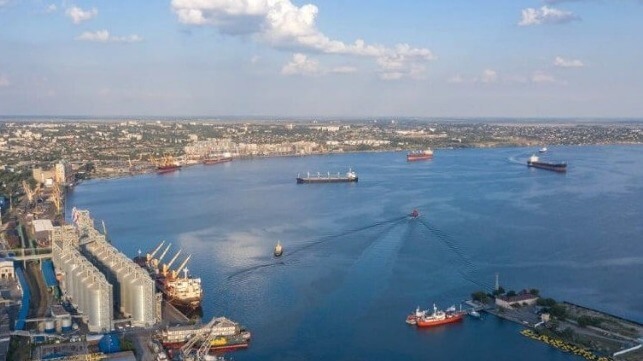UK Says Russia Targeted Liberian Cargo Ship During Odesa Missile Attack

UK officials on Monday accused Russia of having targeted a commercial ship in the port of Odesa during a missile attack, saying that Ukraine’s air defenses had intercepted the missiles. The statements came just days after Prime Minister Rishi Sunak revealed that the Royal Air Force was monitoring Russian activity and would increase its efforts to protect commercial shipping.
According to a statement from the Foreign, Commonwealth & Development Office, a Russian Black Sea Fleet missile carrier conducted the attack on August 24. An unidentified “Liberian-flagged cargo ship” berthed in the port was said to have been the target. The UK statement said that intelligence showed that the Russian military targeted a cargo ship in the Black Sea with multiple missiles.
Ukraine’s air defense system reportedly defended against the incoming missiles and was able to shoot down the assault, which included two Kalibr missiles. Ukraine has also reported success in downing the incoming drones used to attack the grain infrastructure. Two weeks before the reported missile attack, Russia also fired on a ship in the Black Sea heading to Ukraine.
The timing of the attack came days after the first commercial ship trapped in the Ukrainian Black Sea ports tested the newly established humanitarian corridor. The Joseph Schulte departed the Odesa seaport on August 16 for Turkey as the first vessel through the corridor. The next ship, the Primus, departed on August 27 and was followed by reports of two more ships on September 1.
Ukraine was registering foreign-registered ships trapped in the seaports to travel on its newly established corridor which was set up a month after Russia ended the Black Sea Grain program. Ukraine had warned ships of the danger but promised to guide them out of the port and past mines. Russia had said commercial ships headed to Ukraine would be viewed as combatants and they did stop one inbound ship heading to the Danube seaports.
UK Foreign Secretary James Cleverly said the targeting of commercial ships was part of a pattern of Russian aggression in the Black Sea. In July, the Foreign Secretary said the UK believed Russia might target civilian ships and the United States also warned that it had observed Russia laying more sea mines around Ukrainian ports.
Since July, the UK reported Russia has systematically targeted Ukrainian ports and civilian infrastructure. The attacks they said have so far destroyed 280,000 tonnes of grain – enough to feed over one million people for a year, and more than the total Russia promised to donate to African countries. Russia, the Foreign Secretary said, has also damaged 26 port infrastructure facilities in Odesa, Chornomorsk, and Reni.

that matters most
Get the latest maritime news delivered to your inbox daily.
UK Prime Minister Sunak on the eve of the G20 Summit, detailed some of the UK's efforts in the Black Sea region. He said that the RAF “are conducting flights over the area to deter Russia from carrying out illegal strikes against civilian vessels transporting grain.” While discussing the UK’s plans to address the looming food crisis due to the attacks on Ukraine’s grain infrastructure and exports, Sunak also said, “We will use our intelligence, surveillance, and reconnaissance to monitor Russian activity in the Black Sea, call out Russia if we see warning signs that they are preparing attacks on civilian shipping or infrastructure in the Black Sea, and attribute attacks to prevent false flag claims that seek to deflect blame from Russia.”
Neighboring countries have also been working to aid Ukraine to maintain some of its grain exports, which are critical to the country’s economy. Croatia recently reported that its ports were helping but it is admitted a small outlet due to the distances. Romania has become the largest supporter including expanding the inland routes from the Danube to the seaport of Constanta and promising to support Ukraine’s export efforts.
